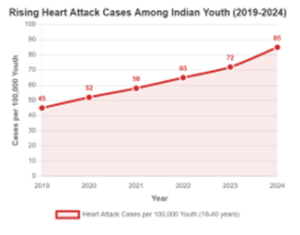Ethics Theory, TLP-UPSC Mains Answer Writing
Q. 1. “There is a growing trend of heart attacks among India’s youth. What are the key social and lifestyle factors behind this, and what preventive measures can be taken?” (150 words, 10 marks)
Introduction
Heart attacks, once considered a health issue of the elderly, are increasingly affecting young Indians under 40. This alarming trend is closely tied to changing lifestyles, social habits, and rising physical and mental stress levels in contemporary India.
Body
Key Social and Lifestyle Factors
- Sedentary Lifestyle and Lack of Exercise: Prolonged sitting and minimal physical activity weaken cardiovascular health. Example: A 2022 ICMR study found that over 70% of Indian youth do not meet WHO’s recommended physical activity levels.
- Unhealthy Diet and Fast Food Culture: High intake of processed, high-fat, and sugar-rich foods contributes to obesity and cholesterol. Example: The rise of online food delivery apps has led to a 35% increase in junk food consumption among urban youth (FSSAI 2023).
- Increased Stress and Work Pressure: Long working hours, job insecurity, and academic pressure elevate stress hormones. Example: A Lancet report in 2022 linked stress to a 1.6x higher risk of heart attacks in youth aged 25–40.
- Smoking, Alcohol, and Substance Abuse: Early onset of these habits damages blood vessels and heart function.
- Sleep Deprivation and Irregular Sleep Patterns: Disrupted circadian rhythms affect heart rate, blood pressure, and hormonal balance. Example: AIIMS studies show that youth sleeping less than 6 hours have a 50% higher risk of heart-related conditions.
- Ignoring Preventive Health Checkups: Low awareness and a culture of neglect delay early detection of risk factors. Example: Only 12% of young Indians undergo regular cardiac screening, as per a 2023 Apollo Health report.

Preventive Measures
- Encourage daily physical activity: WHO recommends at least 150 minutes of moderate exercise per week for adults.
- Promote heart-healthy diets: ICMR suggests limiting trans-fats, added sugars, and sodium while increasing fibre and fresh produce intake.
- Strengthen stress management efforts: Institutions should integrate yoga, meditation, and counseling services as per Ministry of AYUSH guidelines.
- Increase access to health screening: WHO and ICMR recommend annual checkups for those over 30 to detect early cardiac risks.
Conclusion
A multi-pronged approach involving health education, lifestyle reform, and preventive care is essential. As per the Indian Heart Association, over 50% of heart attacks in Indians occur under the age of 50 — a trend that can be reversed with timely and collective action.











